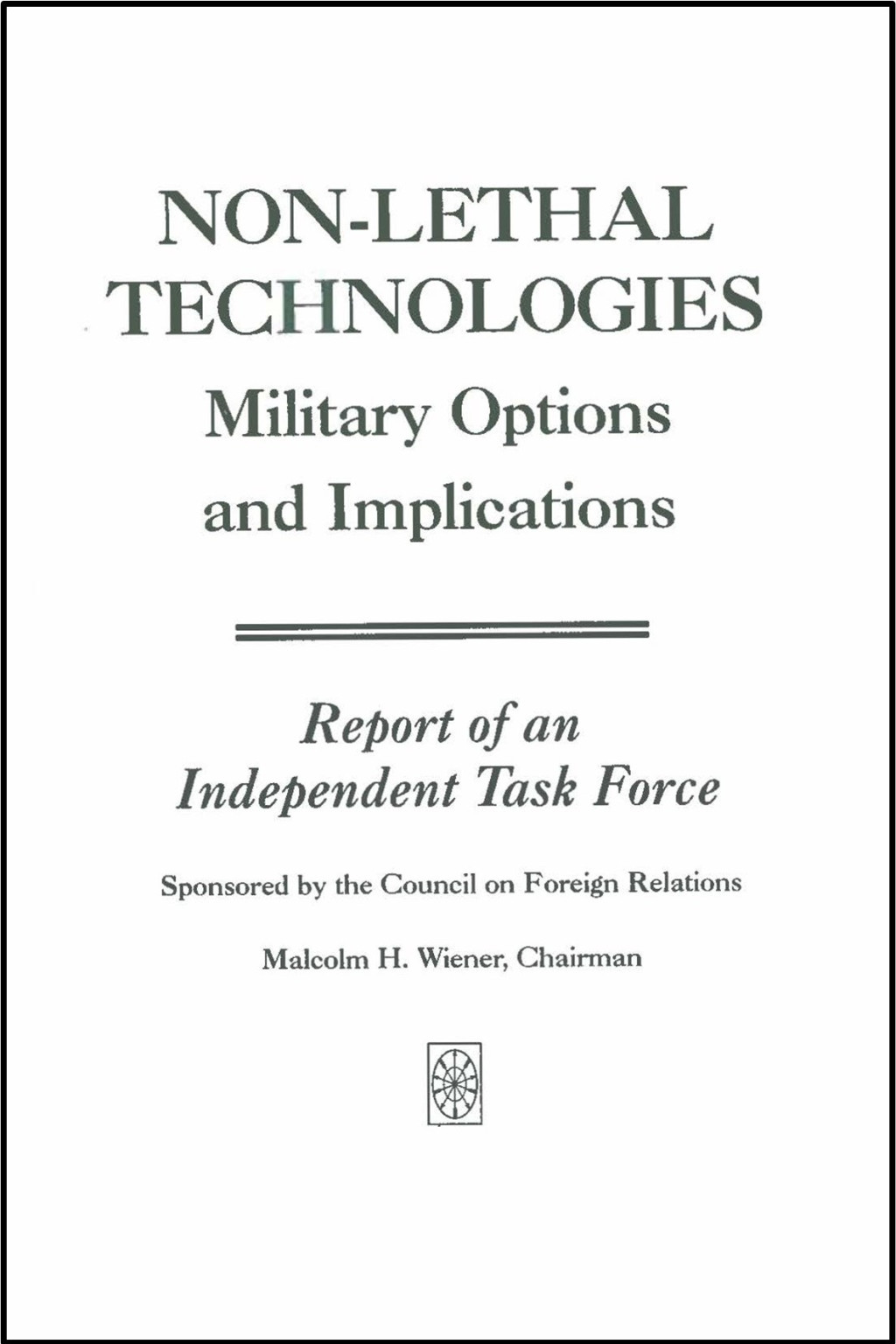Task Force Report No. #4
Non-Lethal Technologies
Military Options and Technologies
- Malcolm H. WienerCochair
What are Task Force Reports?
CFR sponsors Task Forces to assess issues of critical importance to U.S. foreign policy to reach bipartisan consensus on policy recommendations.
Who makes them?
Task Force members aim to reach a meaningful consensus on policy and are solely responsible for the content of their report.
The U.S. approach to international conflicts in the post-Cold War period—how we think about them and what actions we take—is enormously affected by America’s capabilities to quell them by diplomatic, economic, and military means. To date, the United States has been trapped between classic diplomatic table-thumping and indiscriminate economic sanctions on the one hand, and major military intervention on the other hand. But a new and effective middle option may emerge in the future, one that could lend weight to U.S. crisis diplomacy in situations such as the conflict in Kosovo and offer new capabilities for pressuring adversaries or fighting wars with minimal loss of life. This potential new option could come in the form of non-lethal warfare.
To explore this potential and its impact on policy, the Council on Foreign Relations sponsored this independent Task Force to assess the current status of non-lethal weapons development and policy. The Task Force found that while the military services have been examining non-lethal possibilities for years, weapons development and thinking usage has been very slow. This report recommends that the administration take three urgent steps: first, set clear guidelines for working through the pros and cons of when and how these weapons might be employed; second, provide substantial new funds for research and development; and third, ensure better leadership and coordination of this process within and among the military services. Until the administration is ahead on these fronts, and the Defense Department engages in a much more serious and systematic evaluation process, the Task Force judges that policy-makers will be in no position to determine just how useful non-lethal weapons might be and set policy accordingly.
Task Force Members
Task Force Members:
KENNETH L. ADELMAN: Mr. Adelman is Vice President of the Institute for
Contemporary Studies and a nationally syndicated columnist. He was Director of the U.S.
Arms Control and Disarmament Agency and Deputy Representative to the United
Nations.
JOHN ALEXANDER: Dr. Alexander was Project Manager, Non-Lethal Defense, at Los
Alamos National Laboratory. Before retiring from the Army, he was Director, Advanced
Systems Concepts, U.S. Army Laboratory Command.
JOHN L. BARRY: Colonel Barry is Commander of the 39th Air Wing, Incirlik, Turkey
and has recently completed a Fellowship at the Kennedy School. Previously he served as
Military Assistant to Secretary Dick Cheney.
TYRUS W. COBB: Dr. Cobb is President of Business Executives for National Security
and a Senior Fellow at the Center for Strategic and International Studies. He served on
the National Security Council staff from 1983 until 1987.
MICHAEL J. DUGAN: General Dugan is currently President and CEO of the National
Multiple Sclerosis Society. He formerly served as Chief of Staff of the U.S. Air Force.
DOUGLAS J. FEITH: Mr. Feith is founding partner of Feith & Zell. He has served in
several positions at the Department of Defense and at the National Security Council.
ALISON B. FORTIER: Ms. Fortier is an Executive at Rockwell International,
responsible for coordinating national security issues. Prior to joining Rockwell
International she served on the National Security Council staff.
RICHARD L. GARWIN: Dr. Garwin is IBM Research Fellow Emeritus. Currently he
also serves as Vice-Chairman of the Federation of American Scientists.
LESLIE H. GELB: Mr. Gelb is President of the Council on Foreign Relations. He was
foreign affairs columnist and Editor of the Op-Ed Page for The New York Times. He also
served as Director of the State Department’s Bureau of Politico-Military Affairs.
KENNETH H. KELLER: Dr. Keller is Senior Vice President and Senior Fellow for
Science and Technology studies at the Council on Foreign Relations. Previously he
served as President of the University of Minnesota.
GEORGE KENNEY: Mr. Kenney is an author and consultant. He was a career foreign
service officer and a consultant at the Carnegie Endowment for International Peace.
ROBERT H. KUPPERMAN: Dr. Kupperman is Senior Adviser at the Center for
Strategic and International Studies. Before joining CSIS he was chief scientist at the U.S.
Arms Control and Disarmament Agency.
JESSICA T. MATHEWS: Dr. Mathews is senior fellow at the Council on Foreign
Relations. She served as deputy to the undersecretary of State for global affairs and
was vice president of the World Resources Institute.
EDWARD C. MEYER: General Meyer is the former Chief of Staff of the U.S. Army. He
is currently Chairman of GRC International.
JOEL W. MOTLEY: Mr. Motley is Managing Director of Carmona, Motley and Co,
specializing in underwriting and financial advice for municipalities around the country.
RICHARD N. PERLE: Mr. Perle is a Resident Fellow at the American Enterprise
Institute. From 1981 to 1987 he served as assistant secretary of Defense for international
security policy.
HARVEY M. SAPOLSKY: Dr. Sapolsky is Professor of Political Science at the
Massachusetts Institute of Technology and Director of the MIT Defense and Arms
Control Studies Program.
DANIEL A. SHARP: Mr. Sharp is President of the American Assembly. He was with the
Xerox Corporation for twenty years and has been an adjunct professor at Columbia
University.
JEREMY J. STONE: Dr. Stone is President of the Federation of American Scientists.
Originally trained as a mathematician, Dr. Stone has been the CEO of FAS for twenty-five years.
MALCOLM H. WIENER: Mr. Wiener is Chairman of the Millburn Corporation, an
investment firm. His publications include works on ancient history, international law, and
contemporary political economy.
MYRON WOLBARSHT: Dr. Wolbarsht is Professor of Ophthamology and Biomedical
Engineering at Duke University. He is engaged in research on laser safety.






